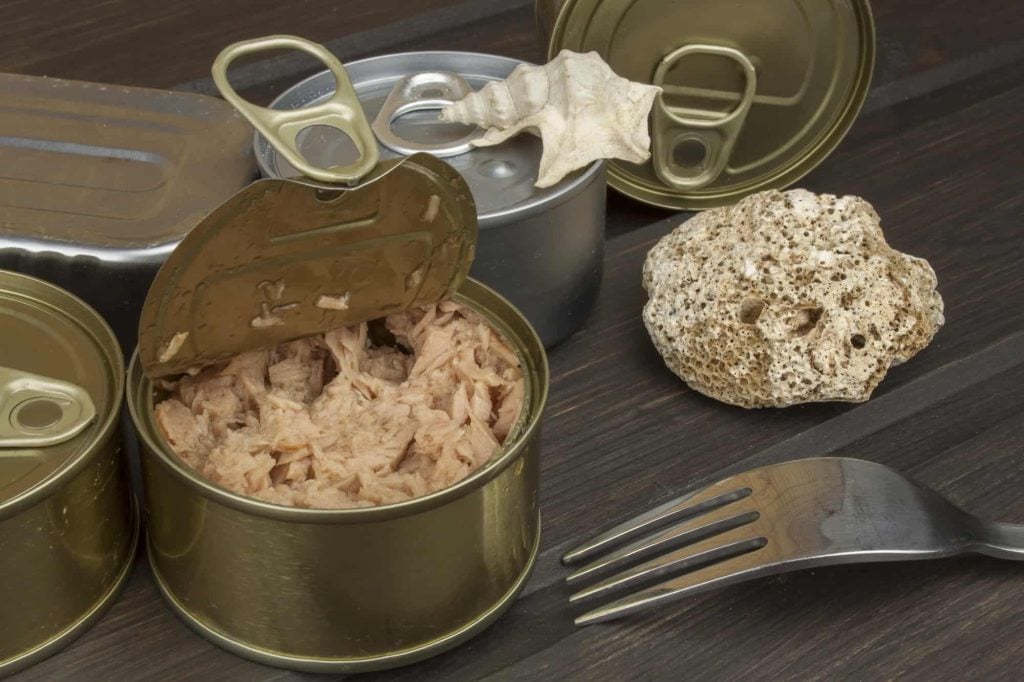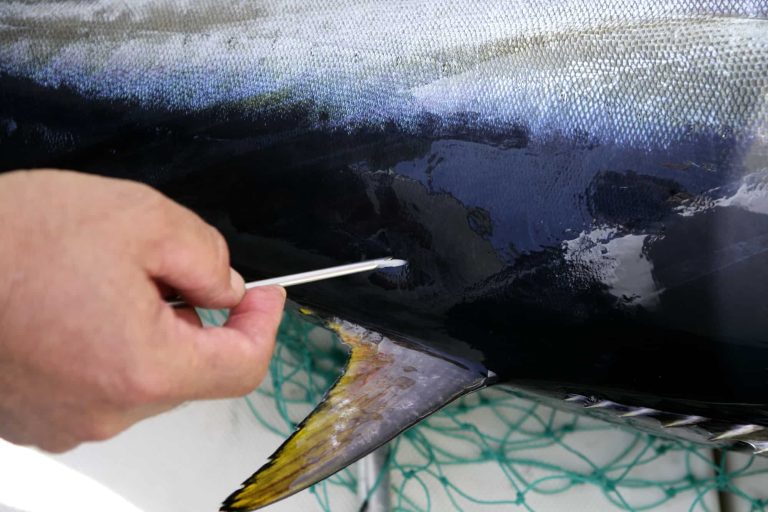Do all tuna fish have scales and fins? This is a question that has puzzled many people for years. Some say that tuna fish do not have scales, while others claim that they do. We’ll explore whether or not tuna fish are kosher, and whether or not albacore, bluefin, and yellowfin tuna have fins and scales.
All tuna fish have both scales and fins. These essential features serve crucial purposes: fins aid in breathing and swimming, while scales provide protection against predators. The presence of both scales and fins makes tuna permissible to eat (kosher) in Jewish tradition.
In this article, we will explore a variety of tuna species, examining their individual characteristics and scales in detail. Additionally, we’ll discuss whether each type of tuna has been certified kosher, ensuring that those who adhere to Jewish dietary laws can make informed choices.

Do Tuna Fish Have Scales?
While tuna fish may not exhibit scales as prominently as some other fish species like tilapia or pomfret, they do indeed possess them. These scales, scientifically referred to as scutes, are remarkably small and sparse, often eluding detection by the naked eye. However, when examined under a microscope, the presence of these flat, hard scales becomes evident in all tuna variations.
- Scutes: Small, flat, and hard scales found in tuna fish.
- Microscopic Visibility: Tuna scales are typically invisible to the human eye but can be easily observed under a microscope.
- All Tuna Variations: All types of tuna possess scutes, regardless of their specific species.
Tuna Variations and Their Scales
Let’s explore some of the most sought-after tuna varieties and their distinctive scale patterns:
Renowned for its premium quality and popularity in Asian cuisine, especially for sashimi and sushi, the bluefin tuna boasts a sleek body covered in scales. Known for its large size, the bluefin tuna possesses relatively large scales and fins. Its dorsal fin is particularly prominent, often extending beyond the tail fin. It exhibits a striking color pattern with a blackish-blue dorsal side, a bright silver midsection, and a yellowish underbelly. Its fins, as the name suggests, are a vibrant blue.
Also known as longfin tuna, this species is characterized by its streamlined body, dark coloration, and tiny scales. As a smaller tuna species, albacore tuna has proportionally smaller scales and fins compared to bluefin. Its pectoral fins are elongated, contributing to its streamlined body shape. Its large mouth and eyes are additional distinguishing features.
Ahi Tuna
Similar in appearance to yellowfin tuna, the ahi tuna has a streamlined body with large eyes. However, it differs in terms of its scale distribution. While it has a band of larger scales around its head, the majority of its body is devoid of scales, except for a few behind the corselet. Similar in size to yellowfin tuna, ahi tuna has moderately sized scales and fins. Its caudal fin is often forked, aiding in rapid swimming.
Often mistaken for ahi tuna, yellowfin tuna exhibits a similar scale pattern and body shape. The key difference lies in its eye size, which is smaller compared to ahi tuna. Yellowfin tuna, like ahi tuna, has moderately sized scales and fins. Its pectoral fins are relatively large, contributing to its agility in the water.
A medium-sized tuna species with multiple common names, including cakalang, katsuo, balaya, mushmouth, oceanic bonito, vector fish, and striped tuna, the skipjack tuna is also widely known as “light tuna” when canned. It has a streamlined body with thick scales along its lateral line and corselet, but lacks scales elsewhere. Being the smallest of the tuna species, skipjack tuna has correspondingly smaller scales and fins. Its dorsal fin is often composed of multiple spines, providing stability and maneuverability.
Scales in Canned Tuna
While all tuna species possess scales, these tiny features are typically removed during the canning process. Most canned tuna products are meticulously cleaned to eliminate scales, skin, dark meat, and other inedible components.
The canning process typically involves the following steps:
- Sorting and Pre-Cooking: Tuna fish are sorted by size and pre-cooked to facilitate handling.
- De-boning and Skin Removal: Scales are removed along with the skin during this phase.
- Meat Separation: The tuna meat is separated into light and dark meat, with the light meat being selected for canning and the dark meat often processed into pet food.
- Cleaning and Canning: The loins intended for human consumption are thoroughly cleaned before being placed in cans for preservation.
As a result of these careful procedures, canned tuna products generally do not contain scales.

Tuna: A Kosher Delicacy
A common query among Jewish fish enthusiasts is whether tuna is considered kosher. The answer is a resounding yes. All tuna species, equipped with both fins and scales, meet the essential criteria for kosher fish according to Jewish dietary laws.
The presence of both fins and scales is a fundamental requirement for kosher fish. Tuna’s unique scale structure, though subtle, ensures its kosher certification. Unlike fowl or meat, fish do not need to be slaughtered or salted to be consumed according to Jewish law. Canned tuna is generally kosher as long as it contains only tuna meat. However, it’s crucial to check the ingredient list for any non-kosher additions.
Tuna’s kosher status makes it a versatile and enjoyable seafood choice for Jewish consumers, whether enjoyed fresh, canned, or prepared in various culinary delights.
Non-Kosher Fish to Watch Out For
While tuna itself is a kosher fish, it’s essential to be mindful of potential non-kosher ingredients that might be added to canned tuna products. Here are some examples of fish that are not considered kosher and may occasionally be found in tuna-based products:
- Shrimp, Lobster, and Crabs: These crustaceans are not kosher due to their lack of fins and scales.
- Swordfish: Although it has fins and scales, swordfish is often categorized as a non-kosher fish due to its predatory nature and association with other non-kosher sea creatures.
- Eel: Eels, while having fins and scales, are generally considered non-kosher due to their serpentine appearance and predatory habits.
- Shark: Sharks, despite their fins and scales, are often classified as non-kosher due to their predatory nature and association with other non-kosher sea creatures.
- Oyster, Shellfish, Clams, and Skate: These shellfish and mollusks are not kosher as they lack fins and scales.
Important Note: To ensure that your canned tuna product is kosher, carefully examine the ingredient list for any of these non-kosher fish. If you have any doubts, it’s always best to consult with a reliable source on kosher dietary laws.

Tips for Purchasing Kosher Tuna
To guarantee that your tuna purchase adheres to kosher standards, consider the following tips:
- Rabbinic Supervision: Whenever possible, purchase seafood from establishments that operate under rabbinic supervision. This ensures adherence to kosher guidelines.
- Fresh Tuna with Scales: If rabbinic supervision is unavailable, opt for unprocessed, fresh tuna with visible scales. This guarantees the presence of both fins and scales, the essential requirements for kosher fish.
- Kosher Certification for Processed Tuna: For processed tuna products such as smoked, canned, or pickled tuna, look for certification from a reputable kosher agency or rabbi. This ensures that the product meets kosher standards.
By following these guidelines, you can confidently select kosher tuna products that align with your dietary preferences and religious beliefs.
Tuna Scales: A Culinary Curiosity
While tuna fish undoubtedly possess scales, their edibility is a matter of personal preference and culinary curiosity. While not inherently harmful, tuna scales are typically tough and unappetizing, offering little in terms of taste or texture.
- Tough and Unappetizing: Tuna scales are generally not considered a desirable culinary component due to their texture.
- Raw Consumption: Consuming raw or uncooked tuna scales can be unpleasant, with some describing the experience as akin to eating plastic.
- Cooking for Safety: If you choose to eat tuna scales, it’s essential to cook them thoroughly to eliminate harmful bacteria that may reside on the outer layer of the fish.
While technically edible, tuna scales are not a common or recommended ingredient in most culinary preparations. Their tough texture and lack of significant flavor make them a less desirable choice compared to the tender and flavorful tuna meat.
FAQs
Do tuna have fins and scales?
Yes, all tuna fish have both fins and scales. These adaptations help them swim efficiently and protect their bodies in the ocean.
Which tuna does not have scales?
There is a common misconception that some tuna fish do not have scales. However, this is not true. All tuna species have scales, although they may be very small and difficult to see.
Can Jews eat tuna?
Yes, Jews can generally eat tuna. Most major Jewish authorities consider tuna to be kosher, as it has fins and scales. However, it is important to ensure that the tuna is caught and processed according to kosher laws.
Is tuna fish clean eating?
Tuna is generally considered a healthy and clean food option. It is a good source of lean protein, omega-3 fatty acids, and other essential nutrients. However, it is important to be mindful of mercury levels, as some tuna species can contain higher amounts of this toxic metal.
Experience the taste of the ocean without harming a fin with our vegan tuna sandwich!
Now that you have a deeper understanding of tuna scales and their kosher status, why not delve further into the world of seafood? Explore our articles on salmon skin and other fish species to discover more about their unique characteristics and culinary potential.





Comments are closed.